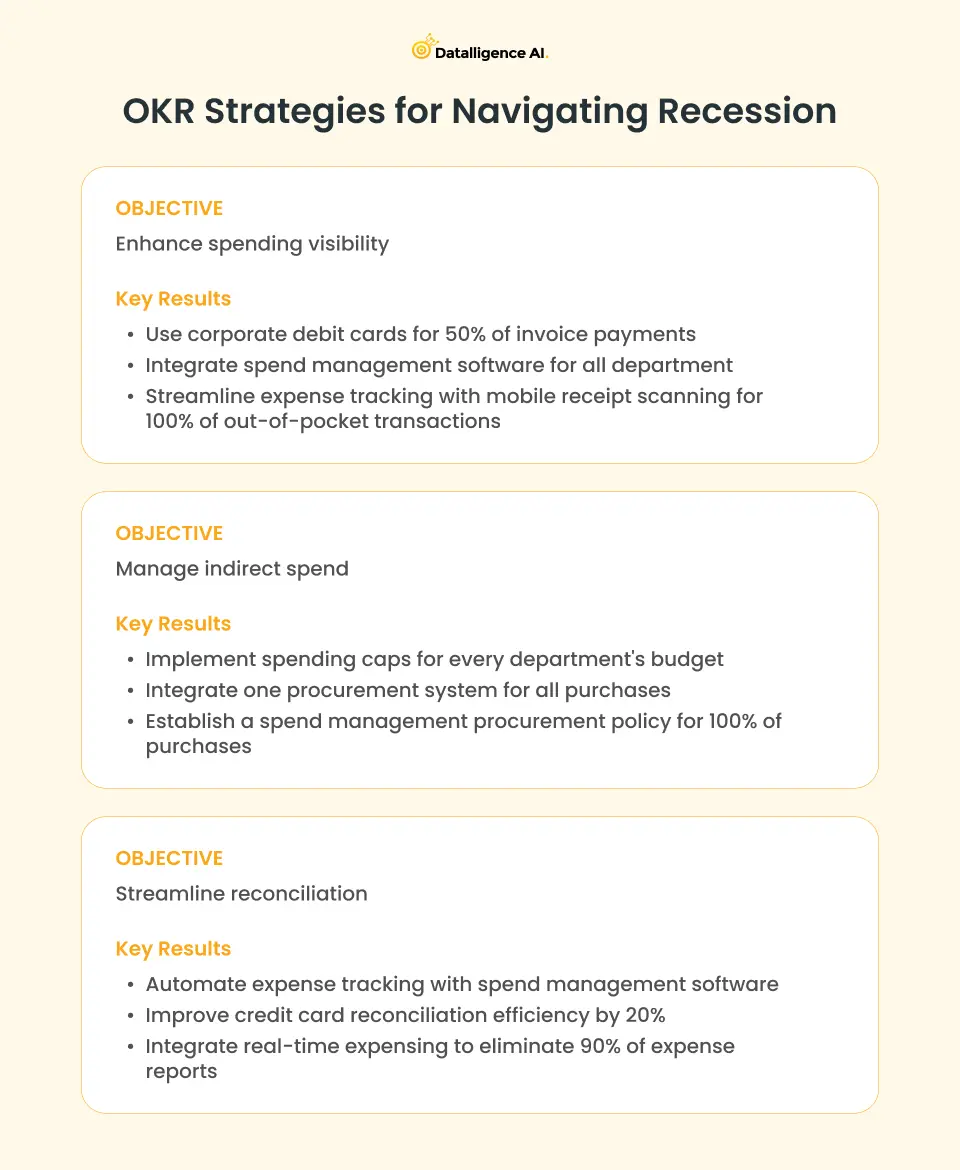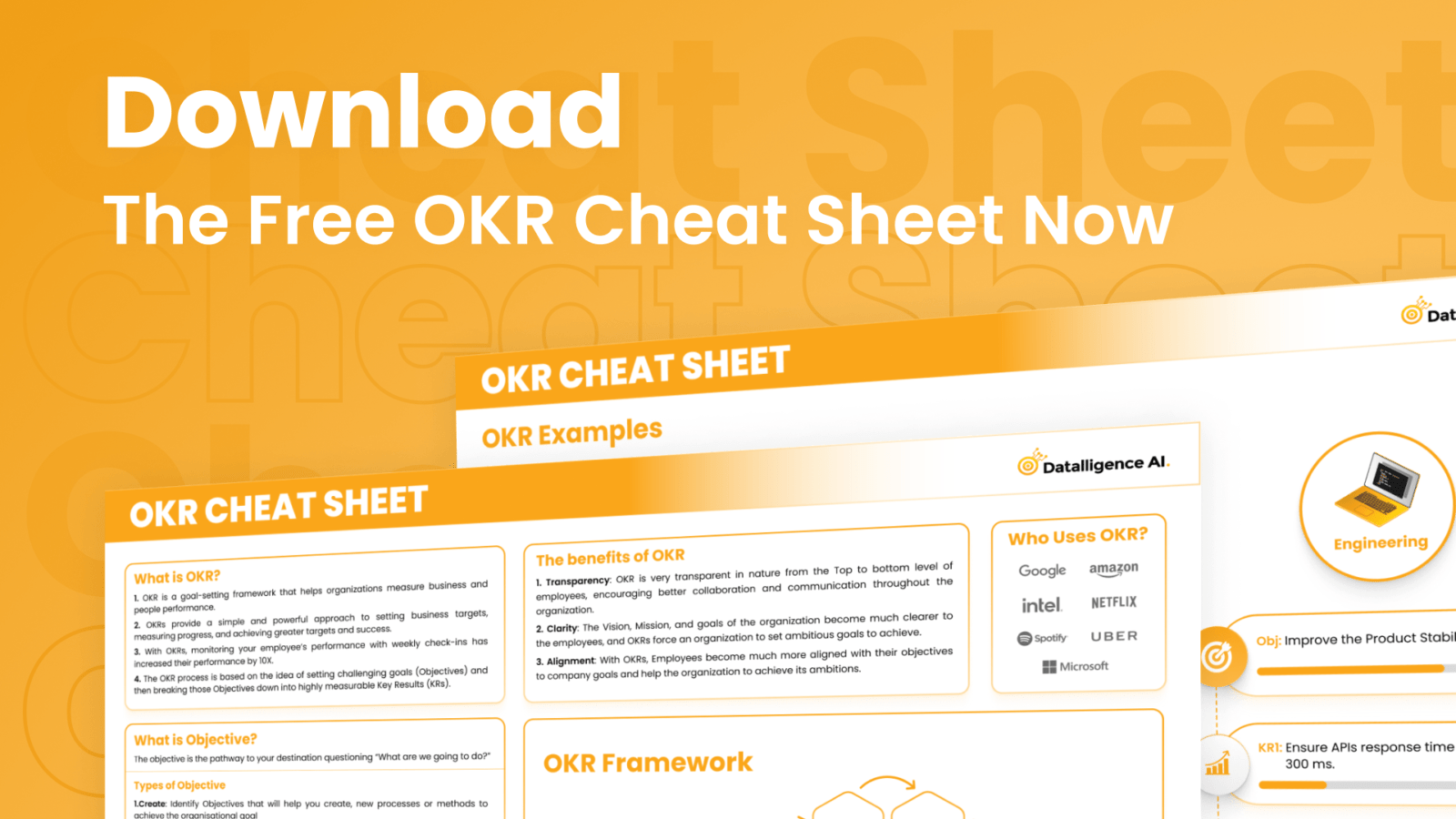In today’s volatile economic landscape, businesses face constant challenges and uncertainties. The recent pandemic, global conflicts, political changes, energy regulations, and climate change have all contributed to the hardships faced by companies worldwide. Recession and inflation are two significant factors that can severely impact business performance and growth.
However, with the right strategies in place, companies can navigate through these challenges and come out stronger than ever. One such strategy is the use of Objectives and Key Results (OKRs) to drive performance and achieve success even in the face of adversity. This article will explore the impact of recession and inflation on businesses and provide actionable insights on how OKRs can help companies manage and thrive in these challenging times.
Table of Contents
The Impact of Recession on Businesses
Recession is characterized by a decline in economic activity, typically measured by a shrinking gross domestic product (GDP) over consecutive quarters. During a recession, businesses often face several challenges that can adversely affect their performance and profitability. These challenges include:
- Poor Sales: Reduced consumer spending power leads to lower market demand, resulting in decreased sales for businesses across industries. To mitigate the impact, companies resort to budget cuts, layoffs, and product discounts.
- Higher Lending Risk: Obtaining credit becomes more difficult as lenders become more cautious during a recession. Companies may struggle to make loan payments, increasing the risk of default and bankruptcy.
- Pay Cuts and Job Losses: Businesses may need to downsize their workforce to align with reduced product demand. This results in pay cuts for existing employees and job losses for others, leading to increased workload and decreased morale.
To navigate through these challenges and ensure business continuity, companies must adopt strategies that promote resilience and agility. This is where OKRs come into play.
Leveraging OKRs to Manage Recession
OKRs provide a structured framework for goal-setting and OKR performance management. By aligning objectives and key results, companies can focus their efforts, track progress, and drive performance even in the face of a recession. Here are some strategies for leveraging OKRs to manage recession effectively:
1. Adopt an Agile OKR Process
Agility is key to surviving and thriving in uncertain times. Agile OKR strategies enable companies to adapt quickly to changing circumstances. By utilizing agile techniques such as sprints and scrums, businesses can build OKRs that align with their overall strategy and promote a holistic goal strategy.
When setting objectives, clearly define desired measurable outcomes and the reasons behind them. Periodically review key results against key performance indicators (KPIs) to identify potential issues and pivot if necessary. Additionally, lay out initiatives and activities that contribute to the success of OKRs, ensuring alignment and collaboration across the organization.
2. Focus on Effectiveness, Not Just Budgeting
During a recession, companies often prioritize budget cuts as a survival strategy. While budgeting control is important, it is equally crucial to focus on improving business results and protecting customers and employees from the economic crisis. Instead of solely budgeting for quick solutions, align financial planning with company goals and OKR Performance management. Create an agile recession and pre-recession plan that focuses on business outcomes and cost reduction. This approach allows for strategic adaptation of goal-setting and budgeting processes, ensuring that resources are allocated efficiently and effectively.
3. Drive Goal Alignment and Efficiency
Efficiency becomes even more critical during a recession. OKRs provide a clear framework for employees to work towards shared goals and measure their performance. By aligning strategies and facilitating communication, OKRs enable teams to identify areas requiring improvement and focus on high-impact activities. Implement a bi-directional approach to OKRs, incorporating top-down and bottom-up perspectives. This encourages innovative thinking and ensures that objectives are aligned with the company’s overall vision. Regular check-ins and meetings allow for ongoing assessment of OKR effectiveness and quick adaptation if needed.
4. Track OKR Performance
Tracking OKR performance is essential for identifying trends, making adjustments, and ensuring progress. Assign percentage benchmarks for key results to measure progress accurately. Set clear accountability and responsibility for each key result, defining expectations for team members. Regularly review OKRs and discuss any shortfalls or exceeded expectations as a team. By tracking performance, companies can identify areas of improvement and make data-driven decisions to navigate through a recession successfully.
5. Stay Informed About Industry Trends
Keeping an eye on industry trends is crucial for staying aligned with market needs and behaviors. By observing how other companies pivot their strategies during a recession, businesses can proactively adapt and adopt better practices. OKR performance management can be used in contingency planning to reassign tasks, set achievable deadlines, and maintain effective communication as the marketplace changes. Staying informed about industry trends helps companies anticipate challenges and identify growth opportunities.
OKR Strategies for Current Industries with AI Influence
In 2025, OKR Performance management are evolving to meet the dynamic demands of modern industries, heavily influenced by emerging AI technologies. Below are the key strategies for implementing effective OKRs in today’s context:
1. Integration of AI in OKR Setting
-
Data-Driven Objectives: AI enables organizations to analyze vast amounts of historical and real-time data, helping set informed and achievable objectives. Predictive analytics can identify market trends, customer behavior, and operational bottlenecks, ensuring OKRs align with strategic priorities4.
-
AI-Assisted Workshops: Generative AI tools streamline OKR workshops by automating brainstorming processes, suggesting objectives based on organizational data, and improving efficiency in goal-setting sessions1.
-
Dynamic Adjustments: AI tools provide real-time insights, allowing organizations to adjust OKRs dynamically as new data emerges, ensuring objectives remain relevant and aligned with business goals4.
2. Enhancing Alignment Across Teams
-
Hybrid Localization Approaches: AI facilitates the shift from rigid cascading models to hybrid alignment strategies that prioritize functional team-level contributions. This ensures coherence across departments while maintaining flexibility for bottom-up input1.
-
Cross-Team Synergy: AI analyzes interdependencies between team goals, fostering collaboration by showing how individual objectives contribute to broader organizational aims4.
3. Improving Tracking and Performance Monitoring
-
Automated Progress Tracking: AI automates data collection and analysis for tracking key results, reducing manual errors and freeing up time for strategic decision-making4.
-
Leading Indicators Identification: AI tools help identify leading indicators that predict success, enabling proactive adjustments to ensure objectives are met efficiently1.
4. Risk Management and Adaptability
-
Proactive Contingency Planning: By forecasting potential risks and market shifts, AI helps organizations build resilient OKRs that adapt to changing circumstances without losing sight of strategic goals
-
Continuous Feedback Loops: Regular check-ins powered by AI insights promote accountability and allow teams to refine their efforts in real time
5. Best Practices for Implementation
-
Align Objectives with Organizational Goals: Use AI-driven insights to ensure OKRs reflect the company’s vision and priorities, motivating teams toward shared success
-
Collaborative Development: Employ a bottom-up approach where employees contribute to creating OKRs, fostering ownership and feasibility in achieving targets
-
Flexibility in Execution: Treat OKRs as adaptable tools rather than rigid mandates; leverage AI insights to evolve objectives as needed
Examples of AI-Informed OKRs
Objective: Enhance Customer Experience Using AI
Key Results:
-
Increase customer satisfaction scores by 20% through personalized AI-driven solutions.
-
Reduce average response time by 30% using automated support systems.
-
Implement predictive analytics to anticipate customer needs and reduce complaints by 15%.
Objective: Boost Operational Efficiency Through Automation
Key Results:
-
Decrease project turnaround time from 6 months to 4 months using AI-powered project management tools.
-
Automate 50% of repetitive tasks across departments to improve productivity.
-
Conduct quarterly training sessions on new AI technologies to enhance team capabilities.
OKR Strategies for Navigating Recession

Conclusion
Recession and inflation pose significant challenges to businesses of all sizes. However, by leveraging OKRs, companies can navigate these challenges effectively and achieve success even in difficult economic conditions. OKRs provide a goal-setting framework that promotes alignment, focus, and accountability. By adopting an agile OKR process, focusing on effectiveness rather than just budgeting, driving goal alignment and efficiency, tracking OKR performance, and staying informed about industry trends, businesses can build resilience and thrive in the face of adversity. To implement a strong OKR execution strategy and prepare for impending recessions, consider leveraging OKR management software, such as Datalligence, to streamline goal tracking and monitoring effortlessly. With OKRs as your guiding framework, you can navigate recession and inflation with confidence and achieve long-term success.
“OKRs provide a structured framework for goal-setting and performance management.” – Datalligence











